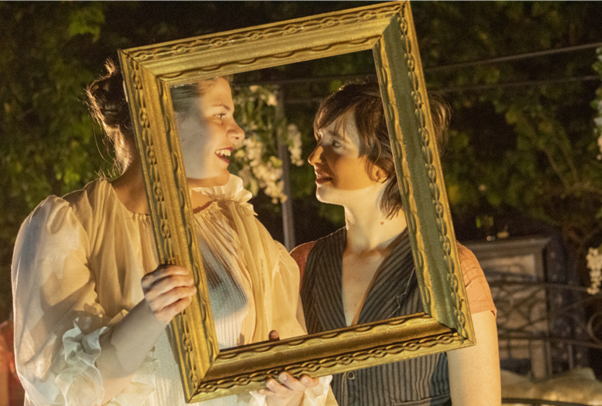Emma Catherine Watkins completed her Masters in Welsh and Celtic Studies at Cardiff University through a Fulbright award. Here she reflects on how that experience shaped her play called 'Unbecoming', which reimagines the true story of a Victorian housewife who became the first to translate the 'Mabinogion', a collection of ancient Welsh myths.
Emma Catherine Watkins completed her Masters in Welsh and Celtic Studies at Cardiff University through a Fulbright award. Here she reflects on how that experience shaped her play called 'Unbecoming', which reimagines the true story of a Victorian housewife who became the first to translate the 'Mabinogion', a collection of ancient Welsh myths.
As a Fulbrighter, I spent a year as a guest in Wales. I was welcomed into communities, both academic and creative, as I strove to gain a deeper understanding of the stories and traditions that have shaped me as a Welsh-American.
At times, I felt myself an insider, as I made friends in Cardiff, reconnected with my Welsh grandmother, and dove into my study of the Mabinogion, a collection of ancient Welsh tales of magic, metamorphosis, and Celtic myth. At other times, particularly as I scrambled to understand Welsh pop culture, I saw that ancestral roots do not necessarily translate to an immediate sense of belonging.
When I embarked on a R&D workshop of my Mabinogion-based play, Trailing Rhiannon, at Cardiff’s Chapter Arts Centre, I was poignantly aware of my place as a Welsh-American adapting Welsh stories. As a Master's student in Cardiff University's School of Welsh, I had focused on the complexities of the Mabinogion as a text.
Beyond the classroom, I had engaged with storytellers across Britain who were re-imagining the ancient stories for modern audiences. In analyzing these performances - including my own play - I considered the ethics of adaptation and authorship.
Fueled by curiosity and discomfort, I began writing a new play, Unbecoming, which explored this tension through the narrative of another "guest" in Wales, whose work with the Mabinogion was of a different nature, and a different time.
Lady Charlotte Guest was an English aristocrat who married into a Welsh ironworks family in 1833. In addition to being a socialite and education advocate, Guest was an accomplished linguist, who became the first to translate the Mabinogion into the English language. The task took her nearly a decade – punctuated annually by the births of her 10 children. But her work as a ground-breaking female translator was quickly dismissed by subsequent scholars, who critiqued her romanticized view of Wales, and trivialized her translation as a "charming" re-telling by a mother for her children.
As I studied the Mabinogion, I became fascinated with Charlotte Guest's ambitious life and fraught legacy. Fortunately, my mentor in the School of Welsh was Professor Sioned Davies, a celebrated scholar, and herself a Mabinogion translator. And unlike the scholars who belittled Guest's work, Sioned has argued on behalf of her fellow translator, suggesting that Guest's translation was in fact a significant achievement: a massive bilingual work, replete with scholarly footnotes, which introduced medieval Welsh literature to a global stage. Sioned has also demonstrated that Guest's translation bears indelible traces of her lived experience as a woman – and might therefore be considered the first feminist reading of the tales.
My play Unbecoming reimagines Charlotte Guest's life, placing her in conversation with one of the Mabinogion characters she translates: Blodeuwedd, a woman conjured from flowers to become a wife. In imagining these two vibrant women – one historic and one mythic, one English and the other Welsh – I explored the themes of agency, authorship, and creation that had permeated my engagement with the Mabinogion. As often happens in a creative process, the play raised more questions than it answered. But one thing remained clear: the complex, marginalized female voices undergirding both the Mabinogion and its translative history recount powerful stories of resilience that resonate across boundaries of culture and time.
As I was finishing the first draft of Unbecoming, Sioned and I visited Charlotte Guest's home in Dowlais. There is, of course, a remarkable feeling of continuity when one tours the beloved home of the first translator of the Mabinogion with Sioned Davies, the only woman to have translated it since. Inspired by Sioned's translation, there has been a resurgence of interest in the Mabinogion, particularly among a new generation of storytellers, who, like me, set out to tell their own re-imagining of the stories with equal parts respect, trepidation, and delight.

An ensemble of Princeton students later produced Watkins' play in a New Jersey backyard, that would later be streamed online. Image courtesy of Cathy Watkins
A year after I submitted Unbecoming as my Master's dissertation, an intrepid ensemble of undergraduates at my alma mater, Princeton University, set out to produce the play. When COVID precautions precluded a live audience, the ensemble decided to stage Unbecoming in a New Jersey backyard, creating a film that would later be streamed online. As it turned out, this virtual performance – a compromise born of social-distancing necessities – united communities of artists and scholars across the Atlantic. Most notably, Sioned Davies joined the creative team as a Welsh language pronunciation expert, and shared her perspective as a scholar and translator during a Zoom talkback attended by audiences in the US and the UK. In this time of isolation and division, this reunion was a joyful oasis – a celebration of the Mabinogion, two extraordinary female translators, and an ensemble of theatre-makers, persevering in the face of the pandemic. This, I believe, is the great gift of my Fulbright experience: the enduring sense of mentorship and community, paired with a profound appreciation for the storytelling traditions of Wales, which will continue to inspire me for the rest of my life.
